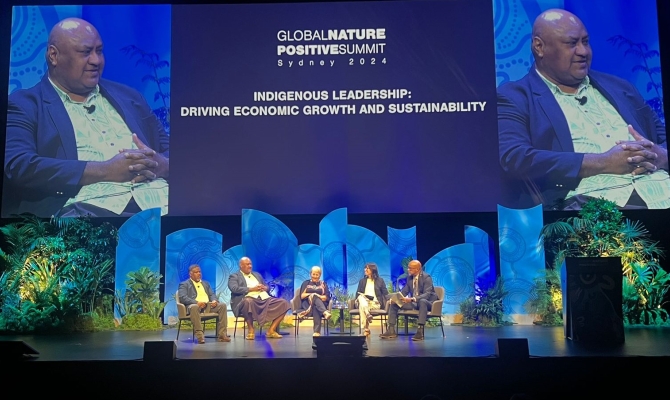The critical role of Indigenous peoples in addressing the triple planetary crises of climate change, biodiversity loss, and plastic pollution was recognised at the inaugural Global Nature Positive Summit (GNPS) held in Sydney this week.
Hosted by Australia, the event has brought together leaders from government, business, academia, environmental organisations, and Indigenous communities to accelerate global efforts toward nature-positive outcomes.
Six Pacific Ministers are among the delegates attending the summit, which opened Tuesday.
During the opening plenary, the Director General of the Secretariat of the Pacific Regional Environment Programme (SPREP), Sefanaia Nawadra, emphasised the need for meaningful engagement with Indigenous peoples to develop solutions for the world’s most urgent environmental challenges.
“Pacific Island countries recognise the land ownership and marine resource rights of their native communities, with over 90 percent of land under Indigenous communal ownership,” said Nawadra.
“However, equitable sharing of benefits with these communities remains a challenge. Real development and conservation only happen when the Indigenous owners who gift their natural resources gain equitable benefits and are able to also afford those trappings of success while continuing to steward their inheritance,”.
The GNPS is designed to catalyse collective action, drive investment in nature, and strengthen conservation efforts worldwide. These initiatives are vital to achieving the goals of the Kunming-Montreal Global Biodiversity Framework, which aims to reverse biodiversity loss and create a “nature-positive” world by 2030.
A key target of the framework is the protection or restoration of at least 30 percent of land and waters by 2030, a goal known as the “30×30 target.” Leaders at the summit are discussing strategies to meet this ambitious commitment, with Australia leading the efforts.
Australia’s Minister for the Environment and Water,Tanya Plibersek, announced in her keynote address that the country now protects 52 percent of its ocean, far surpassing the 30 percent target set under the framework in 2022.
“I’m proud that Australia now protects more ocean than any other country on earth. This is not just a huge environmental win for Australia, it’s a huge environmental win for the world”.
“We are at the start of the road when it comes to nature positive and turning things around. Our job is not just to do the work, but to take others along with us. To build coalitions, with unlikely allies as well as our traditional partners,” the Minister added.
SPREP through the Pacific Islands Roundtable for Nature Conservation (PIRT) mechanism is coordinating the One Pacific Voice at GNPS providing support to Pacific Island delegations at the summit.
The Global Nature Positive Summit 2024 is held from 8 – 10 October in Gadigal Country, Sydney, Australia. Other associated events include the Ocean Dialogue on 10 October and the High Ambition Coalition for Nature and People workshop on 10-11 October.
The Pacific region is represented by Ministers from Cook Islands, Fiji, Niue, Palau, Samoa, Tuvalu as well as delegations from Federated States of Micronesia, Guam, Solomon Islands, Tokelau, Tonga, as well as the Pacific Ocean Commissioner, Pacific Islands Forum and Special Envoy for Climate and Environment from Government of Vanuatu, CROP also in attendance are Pacific Islands Forum (PIF), Pacific Community (SPC), Secretariat of the Pacific Regional Environment Programme (SPREP) and fellow members and partners of the Pacific Islands Roundtable for Nature Conservation.













